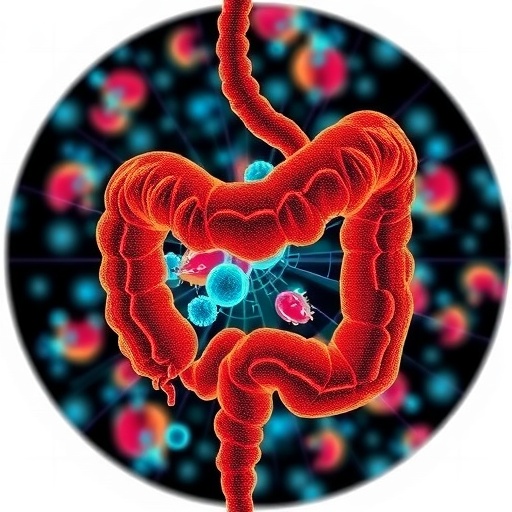In recent years, the scientific community has made tremendous strides in understanding the complexities of Autism Spectrum Disorder (ASD). A groundbreaking systematic review conducted by researchers C.K. Syriopoulou-Delli and D. Chaudhuri has emerged, shedding light on the critical role of gut and metabolic biomarkers in the early detection of ASD. The findings, published in the Journal of Autism and Developmental Disorders, highlight a fascinating intersection of microbiology, metabolism, and neurodevelopment, paving the way for potential advancements in diagnostic methodologies.
At the heart of the review is the exploration of body fluid signatures that could serve as early indicators of ASD. The intricate relationship between the gut microbiome and neurological function is under intense scrutiny, with evidence suggesting that the gut-brain axis plays a crucial role in the manifestation of various neurodevelopmental disorders. Syriopoulou-Delli and Chaudhuri meticulously analyzed existing studies to compile a comprehensive overview of how these biomarkers can be utilized for early detection, which is vital in providing timely interventions.
The review indicates that the gut microbiota composition in individuals with ASD may differ significantly from that of neurotypical individuals. This divergence could point to a metabolic imbalance that exacerbates the symptoms associated with ASD. Analyzing body fluids such as blood, saliva, and urine can reveal these microbial signatures, providing valuable insights into the pathophysiology of the disorder. The researchers underscore the importance of acknowledging these differences in microbiota when considering diagnostic criteria and potential treatment routes.
Furthermore, the review highlights the potential of gut metabolites to act as biomarkers. Specific metabolites, such as short-chain fatty acids and certain amino acids, have been implicated in the regulation of neurotransmitters and immune responses. By measuring the levels of these metabolites in body fluids, researchers could potentially identify individuals at risk for ASD before the onset of clinical symptoms. This early detection may open the door for personalized and preventive interventions that could significantly alter developmental trajectories.
One intriguing aspect discussed in the review is the potential bidirectional relationship between gut function and behavioral symptoms of ASD. While certain gut imbalances may lead to the exacerbation of autism-related behaviors, ongoing behavioral therapies could, in turn, impact gut microbiota composition. This positive feedback loop presents a unique opportunity for integrated treatment strategies that address both metabolic and behavioral components.
The article also delves into the challenges faced in this field of research. One major hurdle is the complexity and variability of the gut microbiome among individuals. Factors such as diet, environment, and genetic predispositions contribute to this variability, making it difficult to establish standard criteria for metabolic biomarkers. Additionally, the timing of sample collection is crucial; collecting data early in life may yield different results than those gathered later, complicating longitudinal studies.
Despite these challenges, the potential implications of this research are immense. If validated, these biomarkers could revolutionize the way we diagnose and manage ASD. Rather than relying solely on behavioral assessments that often occur during later developmental stages, clinicians may soon have access to a suite of biological markers capable of indicating a predisposition to autism from infancy.
As the understanding of the gut-brain axis continues to evolve, Newcastle University’s researchers are calling for increased interdisciplinary collaboration. By uniting experts in microbiology, psychiatry, and nutrition, a holistic approach to understanding and treating ASD can emerge. This convergence of fields may lead to innovations in not only detection but also intervention strategies to restore balance to the gut microbiota.
The review serves as a clarion call for future studies to prioritize the exploration of dietary interventions and how they can influence gut health in children at risk for ASD. Future research could investigate the impact of probiotics, prebiotics, and dietary modifications on microbial composition and behavioral outcomes, creating a foundation for evidence-based nutritional guidelines tailored to these individuals.
Importantly, public awareness surrounding ASD and its biological underpinnings is paramount. Education can aid in destigmatizing the disorder and promoting early diagnosis and intervention. By equipping parents and educators with knowledge about the potential role of gut health in ASD, a supportive environment can be fostered, allowing for early detection and a more effective approach to treatment.
Finally, the potential for gut and metabolic biomarkers to also play a role in monitoring treatment efficacy opens up exciting avenues for further research. As clinical therapies for ASD become more diversified, establishing biological benchmarks could enable clinicians to assess how well interventions are tailored to meet individual needs. This personalized approach heightens the likelihood of positive outcomes for individuals navigating the challenges of ASD.
In conclusion, the systematic review by Syriopoulou-Delli and Chaudhuri is a monumental step forward in understanding the biochemical aspects of Autism Spectrum Disorder. It lays a foundation for translating gut and metabolic biomarkers into practical tools for early detection, underscoring the profound interplay between biological systems and neurological development. The call to action for further research and interdisciplinary collaboration is clear—recognizing the significance of these findings could reframe our approach to autism diagnosis and treatment for generations to come.
Subject of Research: Gut and metabolic biomarkers in Autism Spectrum Disorder
Article Title: Gut and Metabolic Biomarkers in Autism Spectrum Disorder: A Systematic Review of Body Fluid Signatures for Early Detection
Article References:
Syriopoulou-Delli, C.K., Chaudhuri, D. Gut and Metabolic Biomarkers in Autism Spectrum Disorder: A Systematic Review of Body Fluid Signatures for Early Detection.
J Autism Dev Disord (2025). https://doi.org/10.1007/s10803-025-07047-9
Image Credits: AI Generated
DOI: 10.1007/s10803-025-07047-9
Keywords: Autism Spectrum Disorder, biomarkers, gut microbiome, metabolic health, early detection




